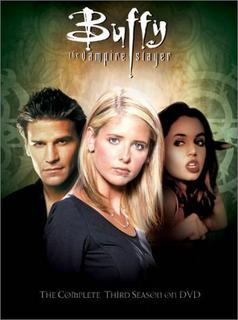Buffy: The Vampire Slayer Season 3

I think it's a toss up between season 2 and 3. Buffy really seems to get it together near the end of the season. Don't know why. I liked the way they dealt with Angel leaving and the final episode resembled something out of LOTR, Buffy style. On the final two episodes, however, I believe that season 2 ended much better then 3. Buffy is forced to grow as a Slayer and as a person so much in two episodes that you can't help but feel sorry for the poor girl. There are some real moral lessons to be found here that I have yet to see on any other show. I also like how Anya becomes a member of the regular cast, that is if I remember the episode I saw on TV recently correctly.
In fact, the whole of season 3 sees the regular cast in a whole new light. Every major character grows in importand and poignant ways. I was most impressed with the progression of the Willow character. Willow seems to have quickly become the spiritual "rock" of the show and has quickly become one of my favorite characters. Dependable, as she puts it. Not to mention that Allison Hannigan is just plain cute to begin with. Unfortunately, Buffy herself seems to have been caught in a permanent holding pattern. She always finds herself wrestling with the same issues over and over again. On with Angel, kill some vamps, off with Angel, slaughter some demons, on again with Angel, solve paranormal phenomenon, off again with Angel, cycle, rinse, repeat. Is this all the character is capable of? It seems to be all she's really accomplished since season one. I'm beginning to believe you're right about Angel being the best thing about the show. However, I have yet to pass judgement on season 4, so don't hold your breath.
Unfortunately, Buffy herself seems to have been caught in a permanent holding pattern. She always finds herself wrestling with the same issues over and over again. On with Angel, kill some vamps, off with Angel, slaughter some demons, on again with Angel, solve paranormal phenomenon, off again with Angel, cycle, rinse, repeat. Is this all the character is capable of? It seems to be all she's really accomplished since season one. I'm beginning to believe you're right about Angel being the best thing about the show. However, I have yet to pass judgement on season 4, so don't hold your breath.
It occurred to me that the reason we didn't actually like the shows before is continuity. I don't want to get off on a rant here, but shows with continuity are fantastic only if you get time to watch week to week. Unfortunately, it also presents a significant barrier to entry. If you can't keep track of what's going on or have someone knowledgeable beside you to fill you in then you're up Shit Creek without a paddle. This is Buffy and Angel's problem: not any stand-alone episodes. That, and from the outside they just look silly. Admit it.
You could say that by the very definition of an episode is that it stands alone. However, perhaps due to Whedon's writing style, these "episodes" do not truly stand alone. (Also note that my definition of episode excludes the well know two-parter.) In order to fully appreciate the show, its characters and especially its innuendo, you have to watch the episodes in order first to last. Therefore, this leaves the poor Nielson box out in the cold with the exception of the hardcore audience that watches every week or is lucky enough to own a Tivo (or - *gasp* - a VCR). With no choice except to watch what's on right now, prospective viewers are sharply divided into two groups. The first group is intrigued by what they see to the point that they continue watching. They might even be interested enough to buy it on DVD. On the other hand, the second group will commence channel surfing to something that they can sink their teeth into immediatly. This is, after all, the ADD society nowadays isn't it?
I offer up three radically different solutions to this problem and examples for each. All have their benefits and drawbacks from one extreme to the other. My first example is the time honored "Simpsons." The episodic format in the show keeps it extremely simple. With the sole exceptions of the Sideshow Bob, Who Killed Montgomery Burns, and Halloween special episodes, every last episode of The Simpsons returns Springfield precisely to the th
 On the polar opposite of your TV addiction agenda - both figuratively and literally - is a little show called 24 (or "When will Jack go to the fucking bathroom?"). An episode of 24 is only called an episode because they can only block out an hour of time at once during prime time. Each episode really comprises one twenty-fourth of one long ass real-time movie. As I mentioned earlier, in order to become involved in a show, the viewer must either be intrigued enough by what they see Right Now to "engage" or have a knowledgable buddy about who's willing to miss half the show whilst explaining shit to the newbie. 24 goes through great pains to make sure that the show moves along quickly and almost always presents something interesting on the screen. If the show can't differentiate itself from the rash of other crap on TV, the show won't garner a following and the show will fail (See Firefly). 24's strict real-time format allows no room for error in any department. The writing must support the high concept from beginning to end The direction and suspense must keep up. The writing must be clever and solid. Characters must develop like peeling onions, slowly exposing new layers to the characters. Continuity errors must be scanned for constantly. It ain't easy, but somebody's gotta do it. Shows of this type also present a longer addiction curve - you gotta watch it longer to get hooked on it. This presents a plot development juggling act. How do you keep the action moving, develop the characters and present the story while staying within the show's real-time parameters? 24 is forced to solve these problems each and every new season.
On the polar opposite of your TV addiction agenda - both figuratively and literally - is a little show called 24 (or "When will Jack go to the fucking bathroom?"). An episode of 24 is only called an episode because they can only block out an hour of time at once during prime time. Each episode really comprises one twenty-fourth of one long ass real-time movie. As I mentioned earlier, in order to become involved in a show, the viewer must either be intrigued enough by what they see Right Now to "engage" or have a knowledgable buddy about who's willing to miss half the show whilst explaining shit to the newbie. 24 goes through great pains to make sure that the show moves along quickly and almost always presents something interesting on the screen. If the show can't differentiate itself from the rash of other crap on TV, the show won't garner a following and the show will fail (See Firefly). 24's strict real-time format allows no room for error in any department. The writing must support the high concept from beginning to end The direction and suspense must keep up. The writing must be clever and solid. Characters must develop like peeling onions, slowly exposing new layers to the characters. Continuity errors must be scanned for constantly. It ain't easy, but somebody's gotta do it. Shows of this type also present a longer addiction curve - you gotta watch it longer to get hooked on it. This presents a plot development juggling act. How do you keep the action moving, develop the characters and present the story while staying within the show's real-time parameters? 24 is forced to solve these problems each and every new season.Then there are shows that fall down somewhere in the middle. I can't think of too many shows that skate the line between continuity and stand alone episodes. The only two that come to mind are The X-Files and Ghost In The Shell: Standalone-Complex. GITS is actually unique (as most Japanese shows are) in that the episodes are actually labeled either stand-alone or complex. "Stand alone" episodes never mention or make reference to events in the complex episodes. "Complex" episodes contribute to an overarching story that takes place in only in episodes labeled as such. The X-FIles doesn't label theirs, but they do the same thing. This show format offers writers both the freedom of stand alone episodes but also the flexibility to develop their characters and story beyond the parameters offered by a stand alone episode.
Buffy slips cleanly between 24 and The X-Files. It's comicbookish format allows for great storytelling opportunities but presents a significant barrier to entry. Add to this it's sometimes morbid occultish (to most people) subject matter and you have a show that only the most devoted fan will watch from week to week. It must also contend with the character development arc. Trying to cram a unique story into each episode and develop the characters in continuity with the rest of the season is where Buffy frequently falters. The writing simply is too continuous for most people to get a handle on. Add to that the fact that the first 4 episodes of each season seem to be below par and you get a show that I'm honestly surprised made it thru the first season.